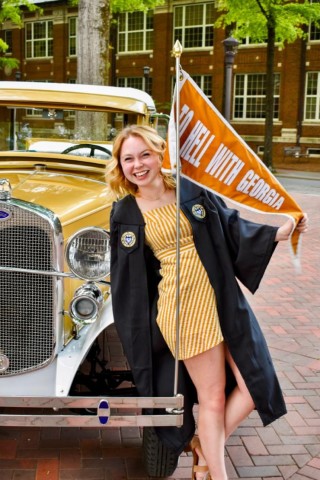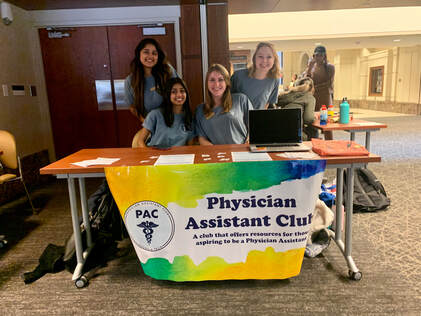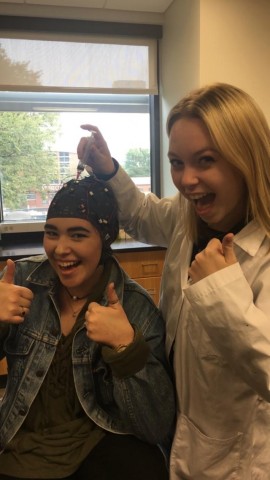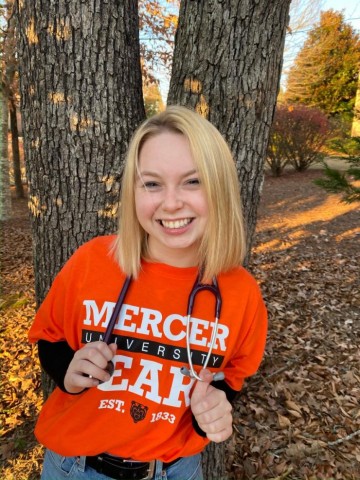



How to Pre-Health at Tech is a new series of stories and experiences with our faculty, current students, and alumni working in healthcare and medical fields. Check back throughout the spring for interviews with:
- Alonzo Whyte, faculty member, academic advisor for the Health and Medical Sciences (HMED) Minor, director of academic advising for the Bachelor of Science in Neuroscience, and development leader in the School of Biological Sciences
- Ritika Chanda, fourth-year neuroscience undergraduate with dual-minors in health and medical sciences and leadership studies
- Jeffrey Kramer, first-year biology undergraduate
- Charles Winter (BIO '12), anesthesiologist assistant
If it wasn’t for her dad’s encouragement, Jenna Nash may never have applied to Georgia Tech. After her admission to Tech, Nash says the resources available for pre-health students at Tech felt like “the missing puzzle piece that fell in place” when deciding what college to attend.
Four years and countless memories later, the Canton, Georgia native graduated in May 2021 with a degree in neuroscience and a minor in health and medical sciences. From her involvement in the Physician Assistant Club as a member and vice president of marketing, to support from peers, professors, and the Neuroscience Club, Nash shares that coming to campus was “the best decision I have ever made.”
Her time at Georgia Tech helped Nash achieve her goal of physician assistant (PA) school. This semester, she begins classes at Mercer University for the Master of Medical Science (MMSc) degree.
Here are Nash’s tips on “How to Pre-Health” at Georgia Tech:
Q: Why did you decide to pursue pre-health at Georgia Tech?
A: I knew going into college that I wanted to pursue a pre-health career, but Tech actually helped secure my decision to become a physician assistant. I was weighing heavily between nurse practitioner, which requires a complete Bachelor of Nursing, then going back to school to become a nurse practitioner for around two years; versus physician assistant, where you can choose your own undergraduate degree and then complete around 27 months of school; versus doctor, which requires a complete undergraduate degree then four or more years of school depending on specialty.
While choosing what school to attend, I knew I wanted to stay in state because of financial reasons, but most schools in Georgia that offered nursing programs did not seem challenging enough to me.
My dad actually encouraged me to apply to Tech, even though I thought there was no way I would get in, and I didn't think it had a huge pre-health program. However, checked all the boxes – challenging, football team, great location – so when I got in, I knew that it was meant to be. From there, I decided to become a physician assistant instead of a doctor because of a mentor in high school that told me about the flexibility and freedom that comes with becoming a PA instead of doctor – then, I knew it was for me. Additionally, I found out there was a club for pre-physician assistant students at Tech which sealed the deal. It was kind of my missing puzzle piece that fell in place. It was the best decision I have ever made.
Q: What resources did you use at Georgia Tech to support your career aspirations, such as clubs, advisors, or supportive professors?
A: One of the best resources for me during my time at Tech was the Physician Assistant Club (PAC). It is tricky navigating how to get into graduate school and it was getting super overwhelming trying to figure it out on my own. My pre-health advisor, Maria Krakovski, and one of my sisters in my sorority, Claudia Varnedoe, encouraged me to join PAC. I am so happy that I did! It helped me figure out what I needed to do while in college, allowed me to form connections with other people that aspired to become PAs, gave me job and volunteering options, and walked me through the application process which was so helpful when it came time to apply for schools my senior year.
One of the best things that came from PAC was the opportunity to work with Good Shepherd’s Clinic, which provided healthcare to uninsured people of Atlanta. At this clinic, I learned how much I loved working with underserved populations and learned a lot about the inequality in the healthcare system of Georgia and the United States.
Another thing I am so thankful for was one-on-one tutoring through the Tutoring & Academic Support Office at the Clough Undergraduate Commons (CULC). I was studying there nearly three times a week for help on subjects that I could not figure out for the life of me. It increased my confidence in my ability to solve problems and allowed me to reflect on what I really understood. Tutoring is a very underused resource at Tech, and I cannot encourage people to take advantage of the tutoring resources enough!
Q: How did Georgia Tech help you during the application cycle for graduate school? Any tips that process?
A: I am so thankful that I had Georgia Tech resources available during my application cycle. I used lots of the available resources, especially when it came to writing my personal statement. I took advantage of the Communication Center to edit my essay a lot. They really helped to critique and organize my thoughts. Writing has always been a weakness of mine, because I write just like I talk, and my message can get confusing; they went through it with me sentence by sentence to make sure every word in my essay was meaningful.
I put to use every bit of knowledge I gained from PAC during the application process. I utilized other students in the Club that I made connections with to review my application and make sure that I did not miss any small details. I encourage students to take advantage of peers with similar goals to share the stress of the application cycle with, because they are an invaluable resource.
Q: What graduate degree are you pursuing and where? Why did you choose that program?
A: I am studying to become a physician assistant (PA) at Mercer University. I knew from high school I wanted to become a physician assistant because of my desire to form connections with patients while still having time to enjoy life outside of my career. I chose the PA program at Mercer because of its proximity to Atlanta. During my time at Tech, I became connected to the city and realized how much it has to provide. But, living in Atlanta and through my involvement at Tech, I also noticed the large population of people in need of healthcare, shelter, food, and more. Since Mercer focuses on service opportunities, I thought this would be a great way for me to give back to the city I learned so much from in college.
Q: What advice do you have for current Georgia Tech pre-health students?
A: Get as many healthcare experiences as possible that you can while you are at Tech. In Atlanta you have access to many different fields – take advantage of that! Try different things, because each thing you do will give you more information and shape your future as a healthcare provider. During those experiences, keep a journal of conversations, patients, or advice that make an impact on you. This will help you in future interviews, when writing your personal statements, or talking about your career. And it is fun to look back at it all when you are questioning whether you have chosen the correct path for yourself.
One of the most important pieces of advice that was given to me is: this is the only time in your healthcare journey where you will get the opportunity to see how different providers handle situations differently. Take advantage of shadowing experiences to determine how you will act as a healthcare provider in the future.
Lastly, develop a network of people that have a career path that is similar to you. For me I had three main people: someone who already was working in the field, someone currently in my chosen graduate program, and then someone that was at the same stage as myself. Having these people to go to with “stupid” questions was so useful and really eased my stress about the whole application process. In my experience, people are flattered when you ask them for help because it makes them feel important, so don’t be afraid to reach out!
Q: What makes Georgia Tech special?
A: I had the best four years of my life at Georgia Tech, and I am forever thankful for everything I learned from my professors, friends, and peers. It was challenging, but at the end of the day, you come out of Tech ready to accomplish anything that is ahead of you. Cherish the moments getting to learn in such a stimulating academic environment. You were chosen to be at this school for a reason.
Feel free to reach out to me if you ever need advice or encouragement! I’m always available. Email Jenna Nash.
Writer: Grace Pietkiewicz
Communications Assistant
gracepz@gatech.edu
Editor: Audra Davidson
Science Communications
College of Sciences
Pre-Health at Tech:
prehealth.gatech.edu
